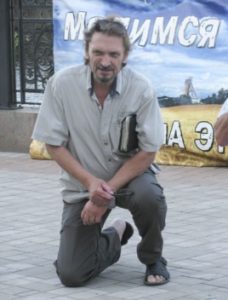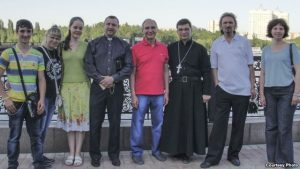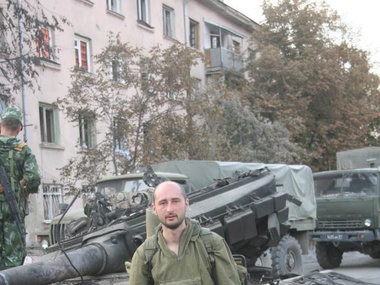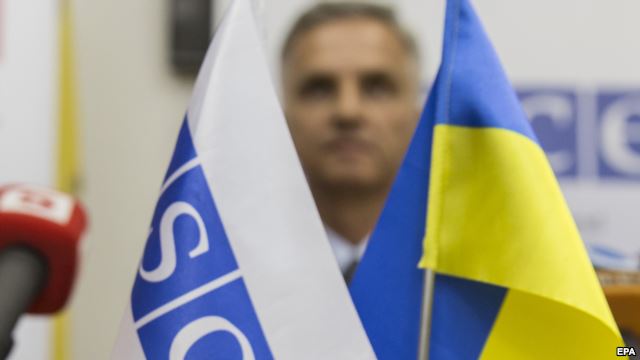The story of Aleksandr Khomchenko, a Protestant clergyman from Donetsk, though sadly all too typical, is no less horrific. This pastor, who prayed for peace in the center of his native city, in his own homeland, was arrested and brutally tortured by the so-called “rebels” of the security services of the “Donetsk People’s Republic (DNR).” This occurred back in August 2014, soon after Igor Girkin, the Russian special operations GRU officer commonly known as Strelkov, invaded Donetsk with his band of militants. Last week the pastor testified in Brussels about the crimes of the Russian invaders he personally witnessed. I spoke with him about his ordeal.
The occupying force did not like that the pastor and the parishioners at Aleksandr Khomchenko’s church in Donetsk’s Constitution Square had been conducting daily prayer services which included praying for Ukraine as part of their worship. According to Aleksandr, before the actual invasion of the city, local Russian thugs would sometimes attack the prayer tent, but they weren’t carrying out an all-out “war of annihilation” against other religious faiths. It turns out, in fact, that these so-called “rebels” had little in common with local Donetsk residents.
The pastor recalls: “I personally witnessed the supposedly ‘local miners’ holding a rally on Artem Street, just prior to which they approached me to ask how to get to Artem Street. In fact, as they were tearing down the Ukrainian flag, they also tore down the flag of the local miners’ football team, and they didn’t even realize what the flag represented. In other words, all of these ‘miners’ were brought to us primarily from Rostov and Belgorod [Russia]. For example, no pro-Russia rallies ever took place simultaneously in Donetsk and Luhansk. These ‘activists’ would hold a rally in one place, and then those same “activists” to the next place and hold a rally there. There were of course local residents who took part in these rallies, especially those union members who were paid to attend. And of course there were others who participated because they sincerely believed the stories they were told about ‘evil Banderites’ [Ukrainian nationalists] having taken over Ukraine. They probably also sincerely believed the promises that their bank debts would be forgiven.”

According to Khomchenko, local thugs attacked the prayer tent on four separate occasions. During these attacks, “our sound amplifying equipment was taken away, they made us remove any symbols of Ukraine, they beat our worshippers, although they didn’t dare more serious provocations than these. But after Girkin and his people appeared in Donetsk under the name of the ‘Russian Orthodox Army,’ it became clear it became clear that there would be no limit to what these fanatics were capable of.”
“Before their arrival, some people from our church had been detained by the militants, but that was more for strategic reasons of our location. For example, our church happened to be a good place from which to conduct shelling and place howitzers. Amazingly, the separatists actually tried to shoot mostly from civilian areas. I personally know that they entered the backyard of the private residence of friends of mine and conducted shelling from behind their fences. And they would even raise a Ukrainian flag. That’s exactly what they did in the heavily populated region of Putilovka, where they fired right from the backyards of 9-story houses. Thank God there was no return fire from the Ukrainian army. But when Girkin arrived, our churches were removed not for strategic purposes but for religious ones. No religion other than that of the Moscow Patriarchate can exist,” says the Protestant pastor.

“Praying in the central part of the city became more and more dangerous. We might start with 250-300 worshippers, but by the end no more than 40 would remain.” Aleksandr recalls, “Many parishioners started to forbid their husbands from attending. But I couldn’t abandon my ministry.” Aleksandr said that he had seen the results of his prayer, and understood that people needed him.
“People would come, listen to our sermons and prayers. Some would even ask us directly, ‘Don’t leave. You’re an island of sanity in a world gone mad.’ Some even confessed their sins. For example, one armed militant repented, and tried to give me his gun. We wound up taking the gun and throwing it in the river. Every day I prepared for the fact that I would be arrested. But I decided to stick it out until the end,” recalls Aleksandr.
In addition to prayer, Khomchenko and his assistants helped evacuate people who weren’t able to leave the warzone independently: primarily women, children, the elderly, and the disabled. Finally, the inevitable happened, and Aleksandr was himself arrested. The pastor was initially taken to the Ministry of Interior, which had been captured by the Russian GRU men. It was there that the occupiers carried out their “intelligence” and “counterintelligence.” They sought to have the pastor disclose the names of “Ukrainian residents” still remaining in Donetsk. They wanted to know where the safes were kept, and the names of those financing the church, which the GRU suspected were Americans. Of course, it’s worth stating that the pastor was incapable of answering a single question because he had nothing to do with Ukrainian intelligence.
“It seemed to me that they were fanatics who actually believed in Russian propaganda.” For example, the leader of their intelligence who interrogated me (named Nikolayech), told me that he came from Belgorod to “fight the fascist junta.” It was kind of strange that a man named “Bes” [“Devil” in Russian-ed.] was fighting for Russian Orthodoxy, and a man named “Abwehr” [“Defense” in German-ed.] was fighting fascism. Their Chief of Counterintelligence also told me that he had come for “one great Russia,” the pastor remembers.

After his interrogation, Aleksandr Khomchenko was taken to “the NKVD Makeyevka.” That’s exactly what the militants called their state security apparatus in Makiivka. For four days and nights, the newly appeared NKVD men subjected the detained Khomchenko to the most brutal and perverted forms of torture. Only one of the local security guards, who had known the pastor previously, attempted to treat Pastor Aleksandr as a human being. In fact, he admitted to the detainee that he had agreed to work with the NKVD as a “grub,” people allowed to return home.
Officially Aleksandr was beaten because the militants found checks in the trunk of his car which had Dniepropetrovsk plates. This alone turned out to be sufficient cause to blame the pastor for “working for Kolomoyskiy” [Ukrainian oligarch-ed.].

“When I was first brought to the NKVD basement, they just beat me for about 40 minutes before they even start to talk with me.” They suggested that I convert to Russian Orthodoxy. They offered me $300 a day to serve in their Orthodox order. By the way, the militants clearly didn’t know a thing about Orthodoxy or even Christianity. Several times they arranged mock executions, where I thought I had only seconds to live,” Aleksandr confesses.
The Pastor confirms that it was only his faith and the experience of Christ that helped him to withstand the abuse, even though the pain was excruciating. By his example he couldn’t greatly affect the drunken militants, although he did have an influence on his cell mates. Aleksandr remembers: There were many different people behind those walls. Two of them, father and son, tired of living under constant fire, with no electricity or water, went out to bathe in the local pond, and on the way back, they were detained to act as artillery fire spotters. A DNR prosecutor also sat in jail with me.”
“They beat one detainee, named Veniamina, so brutally that I simply couldn’t understand how he could have survived. He was a doctor and they arrested him right in his office because the militants received some information that he had been on Maidan [in Kyiv during the Euromaidan protests in 2014-ed.]. Once he came to me and said, ‘Father, they told me that they are going to execute me tomorrow. I don’t know what to do.’” the pastor remembers.
“Once they hung me by my arms and placed a gasmask over my face and shut the hose. As I began to choke, they’d release the hose so I would take a reflexive deep breath. And just at that very moment as I inhaled deeply, they slipped me some cotton with alcohol. I passed out. The next time they did this same thing to me, I inhaled again and the militants had connected water to the hose. I breathed a ton of water into my lungs through the hose of the gasmask. When I came to, with my head hanging down, the thugs took a stick and beat the water from my lungs,” continued the pastor.
After four days of hell, Aleksandr was freed from detention. His wife, who had always panicked in fear around people with weapons, mustered the courage to face DNR militants armed to the teeth in order to save her husband. Fortunately, after the intervention of relatives, the Protestant pastor was released. But he recognizes that he will undoubtedly remember his captivity in Donetsk for the rest of his life.







